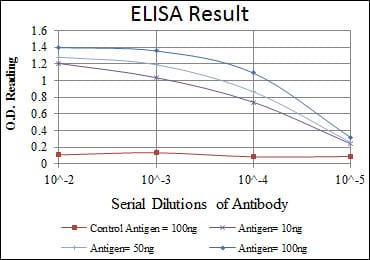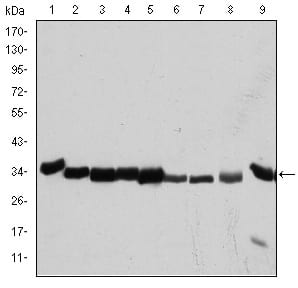

| WB | 1/500 - 1/2000 | Human,Mouse,Rat |
| IF | 咨询技术 | Human,Mouse,Rat |
| IHC | 咨询技术 | Human,Mouse,Rat |
| ICC | 技术咨询 | Human,Mouse,Rat |
| FCM | 咨询技术 | Human,Mouse,Rat |
| Elisa | 1/10000 | Human,Mouse,Rat |
| Aliases | CDC2; CDC28A; P34CDC2; MGC111195; DKFZp686L20222; CDK1 |
| Entrez GeneID | 983 |
| clone | 5A6 |
| WB Predicted band size | 34kDa |
| Host/Isotype | Mouse IgG1 |
| Antibody Type | Primary antibody |
| Storage | Store at 4°C short term. Aliquot and store at -20°C long term. Avoid freeze/thaw cycles. |
| Species Reactivity | Human,Mouse,Rat,Monkey |
| Immunogen | Purified recombinant fragment of human CDK1 expressed in E. Coli. |
| Formulation | Ascitic fluid containing 0.03% sodium azide. |
+ +
以下是3篇关于CDK1抗体的参考文献及其摘要概括:
---
1. **文献名称**:*CDK1 is a prognostic biomarker and mediates resistance to chemo-radiotherapy in cervical cancer*
**作者**:Li, X., et al.
**摘要**:该研究通过免疫组化(使用CDK1抗体)分析宫颈癌组织中CDK1蛋白表达水平,发现CDK1高表达与患者预后不良及放化疗耐药性显著相关,提示CDK1可作为潜在治疗靶点。
---
2. **文献名称**:*Cyclin-dependent kinase 1 (CDK1) correlates with cell proliferation and immune infiltration in hepatocellular carcinoma*
**作者**:Wang, Y., et al.
**摘要**:研究利用CDK1抗体进行Western blot和免疫荧光实验,发现肝癌细胞中CDK1过表达促进细胞周期进展,并与肿瘤微环境中免疫细胞浸润水平相关,为CDK1在肝癌免疫治疗中的作用提供依据。
---
3. **文献名称**:*A monoclonal antibody-based ELISA for quantification of CDK1 in human serum: applications in cancer diagnostics*
**作者**:Zhang, H., et al.
**摘要**:该文献开发了一种基于CDK1单克隆抗体的ELISA检测方法,用于定量人血清中的CDK1水平。验证显示其在乳腺癌和结直肠癌患者中灵敏度高,可能作为无创诊断工具。
---
4. **文献名称**:*CDK1 inhibition induces mitotic catastrophe and enhances chemosensitivity in triple-negative breast cancer*
**作者**:Chen, L., et al.
**摘要**:通过CDK1抗体介导的靶向抑制实验,发现抑制CDK1可诱导三阴性乳腺癌细胞有丝分裂异常并增强对紫杉醇的敏感性,为联合治疗策略提供理论基础。
---
以上文献均涉及CDK1抗体的实验应用,涵盖临床预后、分子机制及检测技术开发等方向。
CDK1 (Cyclin-Dependent Kinase 1), also known as Cdc2. is a critical serine/threonine kinase that regulates cell cycle progression, particularly the G2/M phase transition and mitotic entry. It forms a complex with cyclin B, and its activity is tightly controlled by phosphorylation/dephosphorylation events and checkpoint pathways to ensure genomic stability. Dysregulation of CDK1 is linked to various diseases, including cancer, where its overexpression often correlates with uncontrolled proliferation and poor prognosis.
CDK1 antibodies are essential tools in biomedical research, enabling the detection, localization, and functional analysis of CDK1 in cells and tissues. These antibodies are widely used in techniques such as Western blotting, immunohistochemistry (IHC), immunofluorescence (IF), and flow cytometry to study CDK1 expression levels, cell cycle dynamics, and interactions with regulatory proteins. Specificity and validation are crucial, as cross-reactivity with other CDK family members (e.g., CDK2. CDK4) may occur. High-quality CDK1 antibodies help identify its role in cancer mechanisms, drug resistance, and therapeutic targeting. For instance, they are employed to evaluate CDK1 inhibition strategies or biomarkers in oncology research. However, variability in experimental outcomes due to antibody clones, sample preparation, or tissue types necessitates careful optimization and controls. Overall, CDK1 antibodies remain indispensable for advancing our understanding of cell cycle regulation and its implications in disease.
×